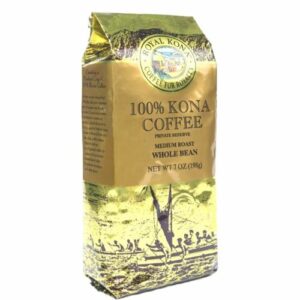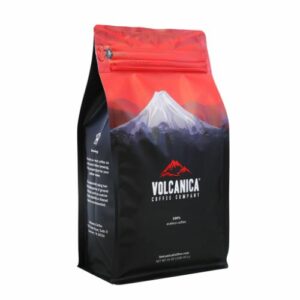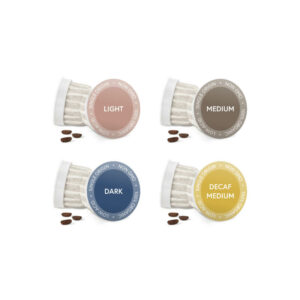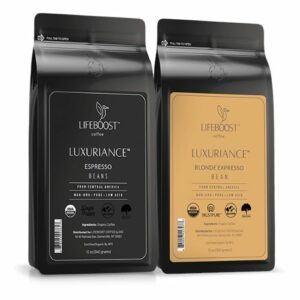If you are a daily consumer of coffee, but the regular acidity and stomach troubles make your days feel erratic, we come bearing the solution to all your problems. Drinking low acid coffee instead of regular one is the answer to all your acidity-related concerns.
Low acid coffee is prepared from coffee beans that haven’t been overheated compared to regular coffee. The rising popularity of low acid coffee in the market can be attributed to its gentler effect on digestion and high antioxidant content. In addition, the less acidicity from that coffee results in lower teeth damage.
When it comes to low acid coffee brands, the market is flooded with a plethora of options, deciding which coffee to buy being confusing. To narrow down the options for you, we’ve tested a large range of coffee from the most well-known brands celebrities endorse to small but reputable companies, finally 7 products winning the confests.
Among of them, crafted using the most purest, high-grade, cost-effective coffee beans, Fabula bagged low-acid coffee takes our top spot. The coffee has everything you need to enjoy a drink without stomach issues or feeling like pooping.
Apart from offering different variations of the coffee, Fabula also allow you to build your customized subscriptions easily and save a lot when shopping on their official website. Continue reading! The brand prepared HUGE discounts for our dearest readers. (time-limited)
Comparison Table
Types of acids in coffee
You might be wondering why coffee is acidic. Regular coffee pH ranges from 4.85 to 5.10. To understand the acidity well, the pH scale runs from 0-14. From 7 to 14 indicates the substance is alkaline.
On the other hand, from 0 to 7, the substance is acidic. With coffee ranging from 4.85 to 5.10, it is naturally acidic. However, pH of low acid coffee is closer to 6.
A neutral substance, like distilled water, has a pH of 7.
To understand why coffee is acidic naturally, these are the responsible compounds.
>> Further readings:
Chlorogenic
Chlorogenic acid is the primary acid found in coffee beans. It is responsible for most of the acidic feel in the coffee. However, roasting coffee significantly reduced its intensity, giving the beans bright tones and dark colors.
Citric acid
Citric acid is found in citrus fruits like oranges, bergamots, and lemons. It’s responsible for the citrusy notes in coffee, mostly originating in the East African countries of Ethiopia and Kenya. The acid makes coffee have high levels of acidity.
Tartaric acid
Tartaric acid is another compound in coffee that gives it an acidic feel. The acid is responsible for giving the coffee grape, tamarinds, and cherry flavors. The acid is high in most coffee from Kenya.
Malic acid
Coffee also contains malic acid. Especially the coffee beans sourced from Central America have high qualities of malic acid. The acid is responsible for the apple, plum, and pear flavors associated with coffee from Central America.
Phosphoric acid
Phosphoric acid is also present in coffee. Unlike unpleasant ones, this one is a bit sweet and gives coffee some mellow feel. However, it’s more potent than other acids as it can comprise up to 1% of coffee bean dry matter.
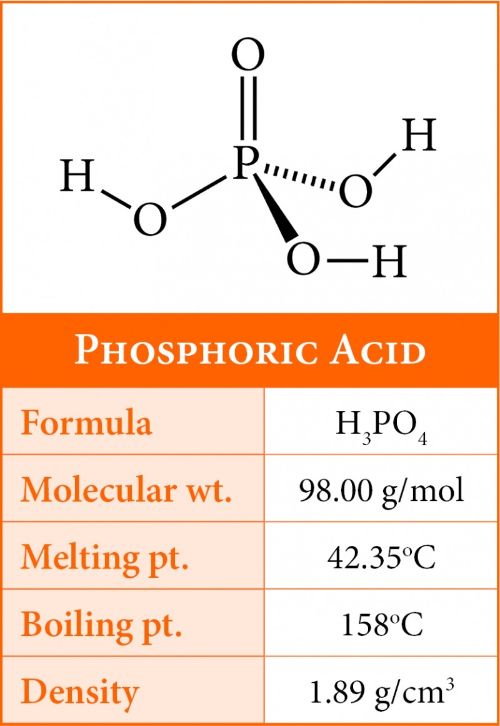
Source: coffeechemistry.com
Quinic acid
Quinic acid is produced when other acids, especially Chlorogenic, degrade due to heat. It is, therefore, more dark roast since they are roasted for a long time. Acid is one of the main compounds that increase sourness in the stomach, alongside other effects.
| Acid | Flavor |
| Chlorogenic Acid | Unpleasant bitter grassy flavor |
| Citric Acid | Fresh oranges, bergamots, and lemons flavors |
| Tartaric Acid | Fresh grape, tamarinds, and cherry flavors |
| Malic Acid | Fresh apple, plum, and pear flavors |
| Phosphoric Acid | A bit sweet and mellow feel |
| Quinic Acid | Unpleasant lingering acidity |
What determines the acidity of coffee?
Coffee acidity differs from one type to another. A lot of factors bring this about. For instance, coffee from Central America is different from one from Hawaii.
These are some of the factors that determine the acidity of coffee;
Bean type
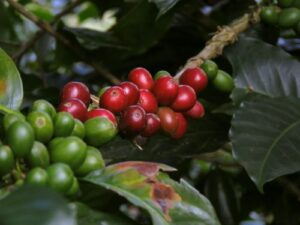
There are two coffee bean types available, Arabica and Robusta. The acid content for each type is different from the other. Generally, Arabica coffee has more acid compared to Robusta.
The reason for more acidity in Arabica is they grow slowly, which enables them to accumulate more acid and flavor. The flavor-rich Arabica has more acid, which explains the mellowness.
On the other side, the lack of citric and phosphoric acids makes Robusta coffee less acidic.
Growing conditions
Another factor that affects acidity in coffee is growing conditions. Coffee is grown in the tropics. However, the regions and conditions differ along the coffee-growing belt.
Most of the coffee growing happens in volcanic soils. Therefore, the nutrients in the soils will affect overall quality in terms of aromas, flavors, and acidity.
Although coffee likes slightly acidic soils, too much acid might lead to acidic beans.
Besides soils, elevation is also essential. Coffee at high elevations tends to grow slowly, maximizing the sweetness. Also, the cooler conditions can lead to acidic coffee.
How low acid coffee is produced?
Going low acid coffee is the best option if you are not into regular coffee. However, how is low acid coffee produced?
Inadvertent low acid coffee
Inadvertent low acid coffee is grown naturally without anything extra to facilitate low acid.
Most naturally grown coffee with low acidity comes from Hawaii, Southern, and Central America. The coffee attains low acidity through field management, like the use of shading.
Additionally, the farmers don’t use chemicals with elements that can raise beans’ acidity.
Most importantly, soils from these regions are naturally suitable for growing low acid coffee.
The processing process also affects the overall coffee acidity. Activities like fermenting and spring water use ensure beans are less acidic.
Treated low acid coffee
Apart from the unplanned and planned field, there are some mitigations you can use to lower coffee acidity.
One of the ways is to roast to dark roast. Roasting for a longer time reduces the amount of caffeine and also the amount of Chlorogenic acid.
When you want less extraction, using coarse grind is a perfect option. Coarse grind delays extraction compared to finely grounded coffee, resulting in lower acid coffee.
Detailed Review: Best Low Acid Coffee
1. Our Top Pick: Fabula Organic Low Acid Coffee
Fabula low-acid coffee is one of the top options for people who can’t take regular coffee. It’s naturally low in acid due to the production process.
The coffee originates from Central America. The high elevations ensure perfect growth, where coffee accumulates vital nutrients and excellent flavor.
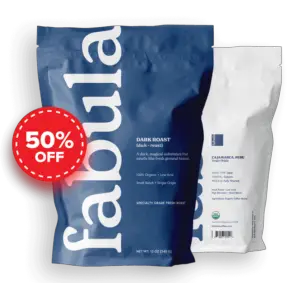
Besides, the shade growing ensures the beans grow to maturity without spraying chemicals. Besides, the soils support low-acid coffee growing since they aren’t too acidic.
Since the coffee undergoes sun drying, it doesn’t have mold or mycotoxins. The testing before delivery allows consumers to enjoy maximum safety.
Whether you love the coffee light, medium, or dark roasted, it is available.
If you don’t drink caffeinated coffee, the coffee is available in decaf. Besides being soft, decaf also has extra low acidity and is not bitter.
With a 50% discount for first time buyers, it’s a highly affordable coffee worth a trial.
>> Read more: Fabula Coffee Review
- Available in different roasts
- Huge discount for first-time and subsequent buyers
- Freshly roasted before delivery
- Instant coffee pods are not available
- 50% Discount limited for first purchase
Buy Fabula Low Acid Coffee & Save 50% Today
2. Best Single Origin: Lifeboost Low Acid Coffee
Lifeboost is a top-rated company that manufactures and sells pure organic coffee. Offering a variety of coffee, there are excellent options to explore.
The coffee is single-sourced from Central America, famous for low organic coffee. Since the coffee comes from contracted farms, it is easy to control the production parameters.
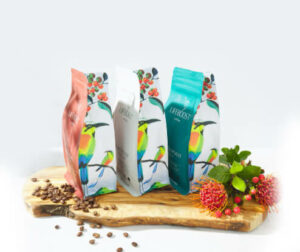
Unlike regular coffee, buying coffee from Lifeboost gives a great experience. The coffee is 27.7% less acidic compared to other coffee from other brands.
Besides the low acidity, you also enjoy low caffeine, which is great for your health. This lets you enjoy more cups without experiencing spiked pulse rates and blood pressure.
The low acid is promoted by coffee being naturally grown. It has no chemical residue and is dried to perfection to ensure no mold.
Since mold causes mycotoxins, they can elevate acidity, leading to stomach problems.
Lifeboost allows you to drink the roast of your choice. You can choose light, medium, and dark roast. Also, decaf is available.
>> Read more: Lifeboost Coffee Review
- Meticulously roasted for espresso
- Great for dairy and non-dairy milk
- Delicious and low in acid
- Free shipping in the US
- 30 days money guarantee
- Blonde espresso is a bit bitter than espresso
- Can cause raised cholesterol
7. Best Budget: Sumatra Mandheling Whole Bean
Mandheling coffee is exclusive to the island of Sumatra, Indonesia. It's one of the finest coffee in the world due to its smooth, heavy, and full-body profile.
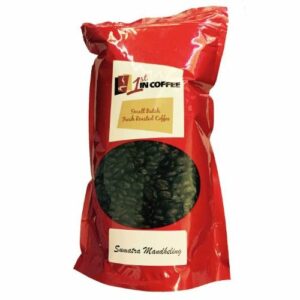
Despite the premium nature of this coffee, it is one of the most affordable specialty coffee on our list. The coffee is naturally low acid due to the shade growing and production in rich soils.
Without using fertilizers and other chemicals, the coffee is super low in acid. Besides, the coffee is hand-picked, selected, and processed through clean spring water.
The drying in the sun ensures the protection of delicate qualities. Due to single sourcing, the coffee exhibits consistent characteristics.
Besides being low acid coffee, dark roasting further reduces present acid. It is, therefore, easy on the teeth and stomach since it doesn’t cause upset after consumption.
Being one of the finest from Indonesia, it's one of the coffee you should taste if you love low-acid beverages.
- Pure mountains grown beans
- Full-bodied and low acid
- Specialized processing process
- Mold-free and sun-dried
- Cheaper than other low acid coffee
- The coffee isn’t grounded
- Muted flavors and aromas
5 Benefits of low acid coffee
Drinking low acid coffee offers tons of benefits. Apart from keeping your stomach easy, there are others that you will enjoy. Some of the main ones are listed below.
Reduced Gastrointestinal acid reflux
When you drink regular coffee, chances are you experience unpleasant acid reflux. The caffeine and other acidic compounds in regular coffee trigger the body to produce more gastric acid, which triggers reflux.
Switching to low acid coffee is the best way to improve the GERD symptoms. With less acid and caffeine, there are fewer chances of getting refluxes.
Safe for your teeth
Acidity is one of the issues that can cause teeth sensitivity. Some people don’t drink coffee due to the tingling in teeth triggered by acidic coffee. Switching to low acid coffee is a better way to protect your teeth from damage by the acid in coffee.
Improved coffee flavor
Although some people can handle acidic coffee, many find it bitter and sharp. The acidity is the reason instead of enjoying a flavorful drink; you experience the bitterness.
Drinking low acid coffee, on the other hand, eliminates bitterness and sharpness. Therefore, you can enjoy the amazing flavor and deliciousness of your coffee.
Improves your workouts
For people in fitness programs, low acid is the best option. Since being active involves the whole body, including the stomach, acidic coffee can trigger heartburn and other effects.
Drinking low acid coffee is amazing since it will not trigger awful effects like acid reflux and heartburn.
Reduces bloating
High acid coffee has been a problem for many people by causing swelling in the stomach. Especially, the acid causes stomach indigestion which can lead to painful bloating.
Opting for low acid coffee means more comfort and no more bloating.
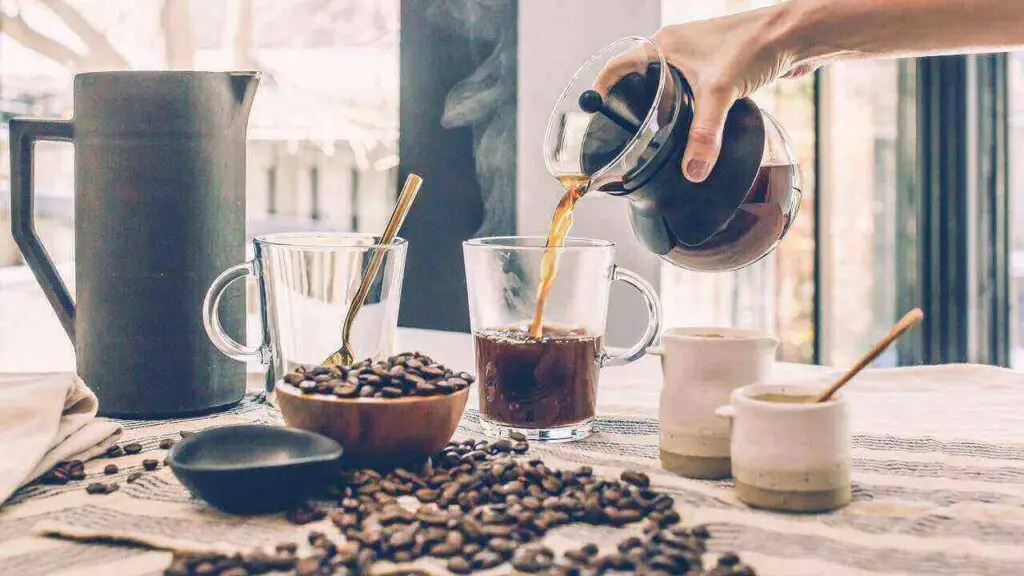
Buying Guide: How to choose the best low-acid coffee?
Getting low acid coffee isn’t a simple task. You need to look for the right product that won’t cause a mess in your stomach. To get ideal low acid coffee, here is what to look for.
Type of beans
One of the determinants of whether your coffee is acidic or not is the type of beans. There are 4 types of coffee in the world, Arabica, Robusta, Excelsa, and Liberica. However, the most common coffee beans are Arabica and Robusta.
When you look at the most consumed coffee, there is a significant difference in acid levels. Arabica has more acids found in coffee, whereas it has moderate caffeine.
On the other hand, Robusta has less acid since it doesn’t have phosphoric acid and citric acid. However, it has more caffeine than Arabica.
Despite being a bit more acidic, Arabica is sweeter.
Roast level
Roasting coffee gives it a bold body profile which makes it taste better. Apart from improving the taste, it reduces acidity due to the degradation of some acids in the beans.
Light roasts are slightly acidic but have the origin of coffee flavors. Therefore, they irritate your stomach; you can switch to darker roasts for less acidity.
Grind size
The grind size is important when extracting coffee. There are coarse and fine grinds. Fine grinds are perfect when you want to get maximum extraction, as in the case of espresso.
On the other hand, course grinds offer less extraction, which is why they are preferred for acidic coffee. Using a coarse grind, you can minimize coffee acidity by limiting the degree of extraction.
Decaf
Decaffeinated coffee has low acidity compared to regular caffeinated coffee. Decaffeination is a process of eliminating caffeine without altering other compounds.
Although Caffeine isn’t acidic, it stimulates the stomach to produce a lot of acid.This can trigger the level of acid resulting in incidences of acid reflux.
By removing caffeine from coffee beans, it means your stomach won’t react by releasing a lot of acid. Therefore, people who drink decaf coffee don’t suffer from increased acid levels in the stomach, which can trigger discomforts.
Freshness
The freshness of coffee is vital in ensuring quality. Freshly roasted coffee is amazing since it delivers authentic qualities. The freshness of coffee is a great consideration when looking for the ideal options.
If the coffee isn’t fresh, it might lose its flavor and other qualities leading to bitterness and increased acidity. It is, therefore, important to always consider brands that sell freshly roasted coffee.
One of the brands that offer fresh coffee is Fabula. The company has a subscription option where you can sign up and become a member. This allows you to receive freshly roasted coffee after the preferred duration.
Fabula allows you to choose shipping intervals from 2 weeks, 4 weeks, or a customized period.
Another one is Lifeboost. It also has a subscription for freshly roasted coffee. The coffee is roasted right before delivery.
Lifeboost offers subscription services where customers get the planned delivery of their choice. You can subscribe for 1 week, 2 week, 4 week, 6 weeks, and 8-week delivery schedule.
Both Fabula and Lifeboost offer excellent discounts and consistency to subscribers.
Price
Low acid coffee is a bit expensive compared to regular. However, it doesn’t mean you should get ripped. On average, low acid coffee costs about $28.64 per pound. However, some can cost even more depending on the brand.
To enjoy the best low acid coffee, the best thing is to look for reputable companies like Fabula and Lifeboost. They always have fair pieces and huge discounts.
Brewing Guide: How to minimize the acidity?
Brewing is crucial when making low acid coffee. The duration determines the overall acid content of a coffee cup.
To enjoy a low acid coffee, these are the brewing aspects you should monitor.
Water
Water is the main ingredient when brewing coffee, making up to 98% of your drink. You can’t brew without water. However, the quality of water determines the final results.
Distilled water offers excellent extraction. This can lead to more acid in your brew. However, hard water can reduce acidity since it has dissolved minerals like calcium and other alkaline minerals.
Although hard water is good for less acidic coffee, it can affect the final coffee flavor.
Brewing time
Brewing time is vital and will affect your coffee taste and acid level. The brewing time is a golden rule that affects acidity and other qualities.
When you want to enjoy low acid coffee, the rule is to shorten the brewing time. Even when using low acid coffee beans, always shorten the time to minimize the extraction.
Cold brew
Cold brewing is a famous way to make delicious coffee that is not bitter. The good thing is cold brewing is also perfect for making low acid coffee.
Cold brewing entails steeping coffee in cold water for 12-18 hours. The extraction process is slow, meaning coffee doesn’t end up with bitter flavors.
Using low acid coffee beans to cold brew will produce a perfectly smooth and highly palatable brew. What if you prefer a hot brew? If your best coffee making process is hot brewing, you can still enjoy low acid coffee. You can use hard water, shorten brewing time and even use additives like sodium bicarbonate.
Additives

Additives to acidic coffee are like shortcuts. They are handy when you want to make a low acid coffee quickly. You can add different alkaline additives to coffee to make it less acidic.
Some additives you can add to acidic coffee include salt, baking soda, eggshells, and other safe alkaline products.
The purpose of these additives is to react with acid and neutralize it. Although the additives are handy, they can also affect the coffee flavor.
Verdict
Low acid coffee is one way to beat the awful experiences that people usually undergo when they drink normal coffee. With many companies turning to supply low acid coffee, it is important to pick the best.
You can bet on the featured products in this guide to be some of the best low acid coffee. Fabula low acid coffee makes one of the best and top recommended coffee. It's low acid and offers some amazing experiences you can think of as a coffee drinker.


